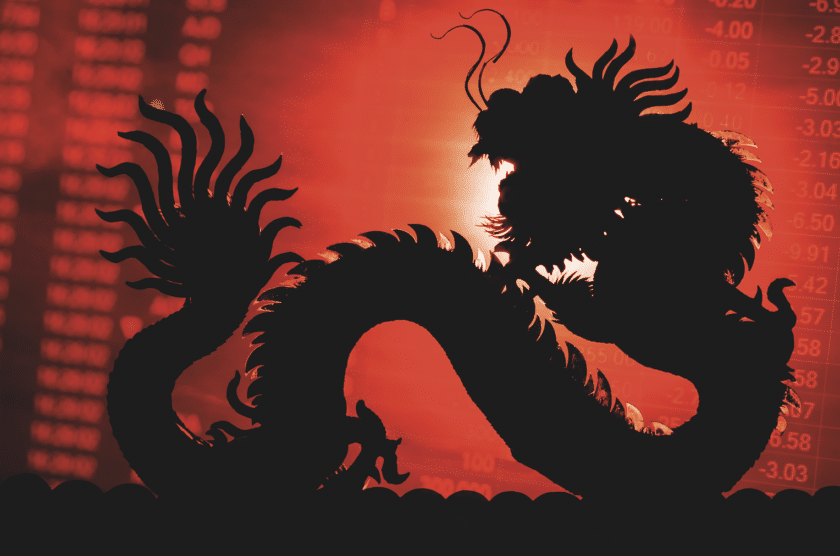Tradition says the Year of the Dragon is a time to ‘brace for various challenges and make more effort to achieve goals’. Chris Metcalfe, chief investment officer at IBOSS, considers whether the prospects for investing in China will reflect that prediction.
This time last year, around the date of Chinese New Year, we wrote a blog focusing on Chinese equities.
In summary, we were relatively positive on Chinese equities following their star performance at the end of 2022, where they were up over 50% from their low in late October that year.
It is important to emphasise that whilst we were positive on China, our Chinese exposure, at the time, only comprised 6.06% of our Core MPS portfolio 4 (30/01/2023).
Our overall message in January 2023 was that an allocation to China was prudent from a diversified portfolio and relative valuation perspective and as a pure investment opportunity. Still, we were also aware of the risks as we saw them while being mindful of the opportunities.
So, with another 12 months behind us, what does our current portfolio allocation to China look like, and what are our views on the current opportunities and risks for investors?
Current Performance
Chinese equity markets lagged global peers in 2023 and have had a difficult start to 2024. Anticipation for a sustained recovery after removing pandemic-related restrictions proved short-lived, as pent-up demand could not offset property sector worries and softer consumer sentiment.
Property stocks continue to act as a lead weight on investor sentiment despite various measures to help boost the liquidity available to property developers. These moves should help ease the lingering cash crunch for Chinese developers who have been at the receiving end of Beijing’s crackdown aimed at addressing the sector’s bloated debt levels.
Reserve ratio requirements (RRR) for banks have also been cut by 50 basis points from February 5, providing 1 trillion yuan in long-term capital. The People’s Bank of China (PBOC) also said there is room for further easing of the monetary policy, but markets now react more to action than words. The market sell-off is attractive, leaving stocks trading below longer-term average levels.
Many multi-asset managers acknowledge that the Chinese equity market looks cheap, but opinions vary wildly regarding whether buy signals are flashing green for China.
Uninvestable Chinese Economy
Given the actions of the communist government in the last few years, it is considered unreliable. Some American politicians have referred to it as uninvestable, but much of the rhetoric is to score points with their electorate. We would caution against writing China off, however, and the communist leadership know full well they must manage a thriving economy if they are going to retain the support of the Chinese people.
It is widely considered that globalisation peaked somewhere around the start of the pandemic, and until then, countries and businesses were running ‘just in time’ supply chains. The pandemic brought home to companies just how fragile this working method was. Reshoring, sometimes called friendshoring, is now a strategy many companies have adopted, meaning they are looking to partner with companies in countries they consider more reliable. For the US market, as an example, this would mean a preference for countries such as Mexico or even Vietnam over China.
As we retreat from peak globalisation and enter a new era, there will be many more examples of governments and companies engaging with new partners to strengthen their supply chains. This will produce different winners and losers, but for now, it looks like China will likely continue losing out in some markets.
However, GDP in China grew 1.0% in the fourth quarter of 2023 to be up 5.2% from a year earlier. Over 2023, growth was also 5.2%, above the government’s 5% target, which was widely expected to be missed only a few months ago. China is still the second biggest global economy, and while it has several complex economic issues, it is undoubtedly not uninvestable on purely economic grounds.
Unfortunately, China finds its relative invisibility diametrically opposed to India’s. Whilst world leaders are queuing up to sign high-profile deals with India and are happy to take the photo opportunity with Prime Minister Modi, nobody in the West wants to be associated with deals with China.
A Sensitive Three-way Relationship
For some time, there have been ongoing rumblings of a potential Chinese invasion of Taiwan, and many column inches have been written on how this may have an even more significant negative impact on the country’s relationship with the US, as well as the world at large.
Many politicians and commentators have extrapolated from Russia’s invasion of Ukraine that China will necessarily invade Taiwan. In our view, the events of Russia’s invasion have little bearing on a Chinese invasion. Not even the most ardent Putin supporter could say that the invasion has so far been a success and even less blueprint for any other country to invade its neighbours.
During January, there was a further twist in the sensitive three-way relationship as Taiwan chose a new leader in the hardest-fought election in decades. But while the Democratic Progressive Party (DPP) held onto the presidency, the political landscape changed dramatically.
Taiwan’s current vice president, Lai Ching-te, won with just 40% of the vote — the lowest winning percentage since 2000. His ruling DPP also lost its majority in the legislature. Opposition votes were split between the Kuomintang (KMT), which failed to gain enough seats to control the assembly, and the upstart Taiwan People’s Party (TPP), which holds the balance of power.
The market reaction to this complicated outcome has been muted. We sense that if it weren’t for the actual conflicts that have broken out in the last couple of years, a potential Chinese invasion would be grabbing more headlines than it is now. We expect this situation to simmer indefinitely, and again, it’s wise to accept that nobody understands when or if an invasion will happen or what the actual consequences will be. We know it would be a terrible outcome for world trade, and the effects on China would be highly economically damaging.
Both the KMT and TPP had pledged to restart talks with China in their campaigns. In the words of TPP leader Ko Wen-je before the vote: “Taiwan’s relations with the US will remain resilient no matter who becomes the new president,” he said. “What will change is how the new government engages with China.”
The failure of either the KMT or TPP to win the presidency — and the collapse of their talks last year for a joint bid — is a setback for Xi, as it shows how little China’s apparent intimidation and influence operations have swayed public opinion in Taiwan. Political observers say China may now need to consider another way to peacefully coexist with its neighbour after military and economic coercion failed.
IBOSS portfolio positioning
Over the past 12 months, we have reduced our explicit Chinese holdings in favour of gaining exposure via Pan Asian and emerging market funds. We decided to make these moves because we think agility could be a key attribute in navigating the tricky waters that are investing in China.
Compared to this time last year, our Core MPS portfolio 4, at the time of writing (26/01/2024), has a 3.4% exposure to China, mainly via our Asian and EM allocation.
Lunar New Year
Chinese New Year 2024 will fall on Saturday, February 10, starting the year of the Dragon, specifically the Wood Dragon. 2023 was the year of the Rabbit, which, according to Chinese tradition, was “likely to be calm and gentle”. Unfortunately, that didn’t quite turn out to be even vaguely true for Chinese equities last year.
This year, tradition says that during the year of the Dragon, “you might need to brace yourself for various challenges and make more effort to achieve your goals”, which may turn out to be more accurate.
One of the fundamentals that have changed in the last twelve months is that positive words and platitudes for lower-ranking Chinese officials just won’t cut the mustard with the markets. Investors are looking for actions from Xi Jinping and the actions from the PBOC; the time for talking has passed.
As ever, there are areas for concern or reasons to be cautious, but we would note that all investment comes with a degree of risk and we continue to remain reasonably positive for Chinese equities as a whole.
Past performance is not a reliable guide to future returns. You may not get back the amount originally invested, and tax rules can change over time. The writer’s views are his own and do not constitute financial advice.































